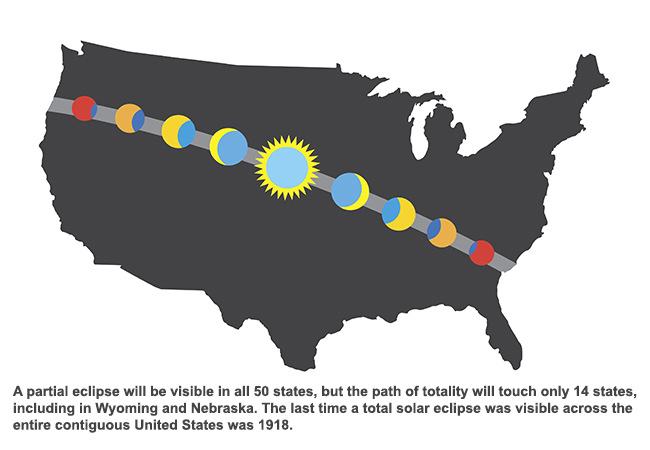Stapleton, a community of about 300 in west-central Nebraska, is perfectly positioned to capitalize on the eclipse mania that is drawing people from across the globe to a narrow swath of small and rural towns stretching from Oregon to South Carolina.
At exactly 12:53:58 p.m. central time on August 21, the sun above Stapleton will disappear behind the full cover of the moon. The sun will fall into darkness for the next 2 minutes and 33 seconds, putting Stapleton on the map as one of the communities with the longest views of total eclipse.

This distinction has not been lost on the residents of Stapleton. While the broader world has been buzzing about the coming eclipse for months, the residents of Stapleton have been planning for their 2 minutes and 33 seconds of fame since 2014.
“We get 500 people up here for our county fair and think that’s pretty good,” said Wilma Salisbury, a local producer who has been involved in eclipse preparations on the Logan County Fairgrounds. “They say we could have anywhere from 5,000 to 15,000 people for the eclipse. We’re hoping half of them will come to the fair to view the eclipse.”
Planners moved the dates for the fair to coincide with the eclipse and put together a $10 package that includes parking, certified viewing glasses and bottled water. Salisbury knows the solar eclipse is the star of the 2017 Logan County Fair. But she and others hope visitors also will tour exhibits and sample food to gain a greater appreciation for Stapleton and its agricultural roots.
Other communities lying in or near the path of the total eclipse also are using this opportunity to show rural America at its best. In Scottsbluff, Nebraska, officials are urging residents to buy weekly essentials early so grocery stores and retailers can restock shelves for visitors. Nearby towns are assigning all city workers and deputies to traffic duty to foster smooth travel, and special observation sites have been established to ensure unobstructed views and a celebratory experience.
Despite all the preparation, communities are braced for challenges. Recently, a rancher in western Nebraska encountered trespassers on his pastureland. When he approached, the visitors told him they were simply staking out a good campsite for the eclipse. Ranchers and farmers worry that visitors unfamiliar with the terrain could unwittingly cause fires or stumble across rattlesnakes and other dangers. Many locals anticipate they will have trash to pick up from fields, canals and ditches.
As Stapleton entered its final stretches of preparation, Salisbury was less worried about the impact visitors might have on the community and more focused on ensuring the community made a good impression. Organizers had arranged for visiting astronomers to be on the fairgrounds to help educate the public. Then there was the last-minute call from an international visitor who needed help locating a wildlife site to observe how animals react to a total eclipse. Just as important were Salisbury’s own guests, many of them former high school classmates who would be joining campers on one of Salisbury’s freshly cut alfalfa fields.
“It has been three years of planning. It’s hard to imagine that it’s almost here. . . We’ve had BRAN go through here,” Salisbury said, referring to an annual bike tour of Nebraska. “This is much bigger. It’s huge.”

